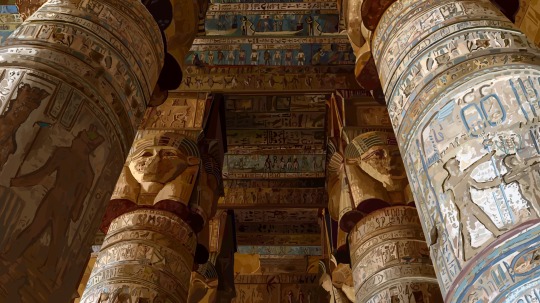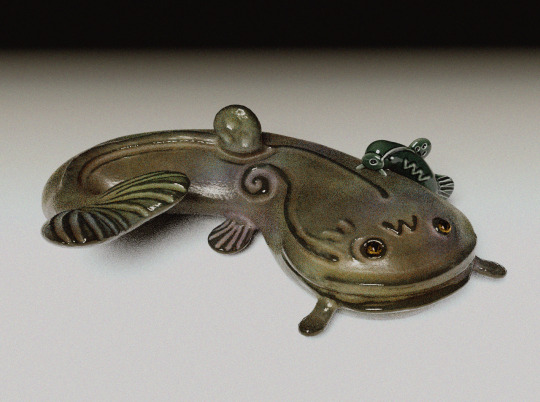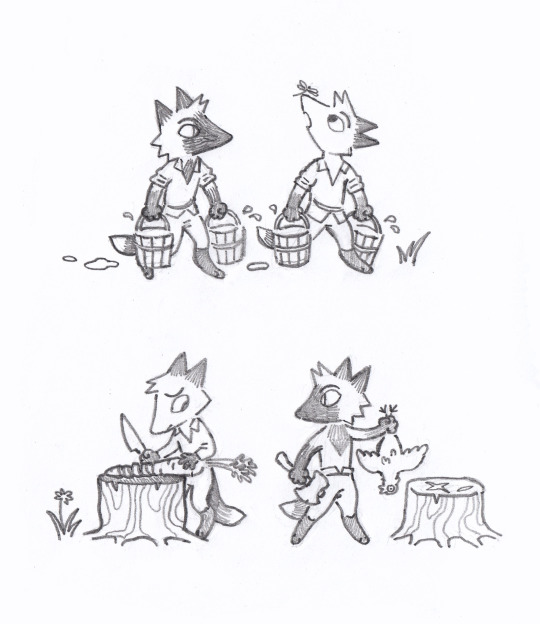Don't wanna be here? Send us removal request.
Text
I think an important part of the "D&D is easy to learn" argument is that a lot of those people don't actually know how to play D&D. They know they need to roll a d20 and add some numbers and sometimes they need to roll another type of die for damage. A part of it is the culture of basically fucking around and letting the GM sort it out. Players don't actually feel the need to learn the rules.
Now I don't think the above actually counts as knowing the rules. D&D is a relatively crunchy game that actually rewards system mastery and actually learning how to play D&D well, as in to make mechanically informed tactical decisions and utilizing the mechanics to your advantage, is actually a skill that needs to be learned and cultivated. None of that is to say that you need to be a perfectly tuned CharOp machine to know how to play D&D. But to actually start to make the sorts of decisions D&D as a game rewards you kind of need to know the rules.
And like, a lot of people don't seem to know the rules. They know how to play D&D in the most abstract sense of knowing that they need to say things and sometimes the person scowling at them from behind the screen will ask them to roll a die. But that's hardly engaging with the mechanics of the game, like the actual game part.
And to paraphrase @prokopetz this also contributes to the impression that other games are hard to learn: because a lot of other games don't have the same culture of play of D&D so like instead of letting new players coast by with a shallow understanding of the rules and letting the GM do all the work, they ask players to start making mechanically informed decisions right away. Sure, it can suck for onboarding, but learning from your mistakes can often be a great way to learn.
12K notes
·
View notes
Text





Sidon telling Link about trinkets to find, and said trinket being a matching hat, is adorable~
insta | ko-fi | twitter | store
4K notes
·
View notes
Text
I dont think anything related to politics and current state of the world has ever enraged and disgusted me more than seeing pro-palestine/marxists/communists/leftist supporters be this extremely hypocritical and evil when it comes to Ukraine. Not only that entire breakout of russian invasion of Ukraine was followed by "what about Palestine/Syria/Afghanistan/Iraq" comments on every video/photo of a destroyed Ukrainian home but also even after more than 2 years of russian invasion and what experts call most brutal war since WW2, this same group of people is constantly minimizing and relativizing tragedy and injustice to Ukraine by lowering number of civilian casualities, holding dearly onto chunks of russian propaganda that have already been debunked countless times, taking announcements of Ukrainian officials out of context or simply excusing oppression of Ukrainians by something unrelated (like supposed support of Ukraine for Israel???). All that while screaming about "double standards" or "Western hypocrisy". Why are Ukrainians who support Israel called out more frequently and harshly than Palestinians who support Russia? What makes Palestine, Congo, Sudan, Syria etc more deserving of sympathy and support than Ukraine? Why are Azovstal defenders called nazis while Hamas is praised as freedom fighters? Why is russian oppression of Ukrainians and erasion of Ukrainian identity that lasted for centuries overlooked? I seriously dont understand psychology behind such reasoning.
179 notes
·
View notes
Text
so we're just not gonna have a national conversation about how Boeing killed one of their own employees to keep him from talking to the press
55K notes
·
View notes
Text
"Jews should go back to where they came from"
Okay. How far back are we talking in terms of come from?
Cause for me personally, there are a lot of different countries I could go back to. Do you want me to go back to South Africa where my dad was born? Or to Liechtenstein where my great grandparents lived? or back to the middle east where my great great grandparents lived? Or to where my bloodline first started near where modern day Israel is?
Or do you just mean that all jews should go back to Europe because you like to erase Jewish history and think that Judaism is a white man thing?
479 notes
·
View notes
Text
I think the reason I dislike the Joker being given backstory is not that I don't want to feel sympathy for the Joker (I mean, that's a small part of it) but rather that I think it undermines the point of the Joker. I don't mean as a character with motivations, I mean narratively. Others have probably said this before, and better than I'm about to, but this is my blog and I'm going to ramble.
The whole point of the Joker that some writers seem to miss (especially films! films are ADDICTED to backstory for some reason) is that there IS no real reason. He's a primary antagonist because his entire schtick is that nothing matters, and that's funny as hell. He can treat people's lives as a joke because they don't mean anything.
Bruce, or Batman, as the protagonist is the exact opposite of this. The motivation to save others from what happened to him as a child is rooted in this concrete, fundamental-to-Batman truth: everything matters. This is why Bruce's parents dying in a random act of violence in a before-then obscure alley has had such staying power: it wasn't a massive event that changed the lives of dozens or hundreds. It was a small thing, a statistic in the grand scheme of violent crime, with no real motive other than desperation or greed. And it changed someone's life completely. For Batman, the hundreds of small acts that fill a patrol all matter because each person does.
Joker's obsession with Batman hinges on him believing the exact opposite, and trying to convince him that he's wrong, and that THE joke is that nothing matters at all-- walking away from a victim and torturing a victim have the same moral weight because there is no moral weight. The point isn't to be the most evil or the most cruel, the point is to prove that it's all pointless.
In a way, this means Joker's greatest ally is the apathy of Gotham. Every person who turns away or keeps walking with their head down and claims "not my problem" supports his claim that nothing matters, because Gotham is proving by inaction that it's pointless unless it impacts them personally. Nobody else matters unless I do, and then it's too late. Do I think Joker's crimes are Gotham's fault, narratively and within their fictional world? Not exactly. But I do think Joker isn't actually an embodiment of chaos but is a representative of what Batman is actually fighting against: a Gotham that doesn't care.
Batman's existence is a defiance of this. His work, masked and unrewarded, is a symbol of the fact that no wealth, no material comfort, no border of security, no past trauma, no law, no excuse justifies not caring. Every life matters, even if it isn't your own, even if it's a stranger. He can't kill Joker in-world because of his moral stance on killing. He can't kill Joker narratively because Gotham won't kill Joker. Batman's driving core is a relentless anti-apathy, and Gotham's current collective social spirit is that they are helpless and not responsible for it.
Joker thinks it's funny that anyone would care, and Batman thinks someone not caring is the opposite of funny. Caring can often hurt, but it isn't pointless. Every single life saved or lost creates a ripple effect that matters and hurts or helps others. Each victim Joker encounters is met with the same presupposition: "I can hurt you and it doesn't mean anything because you're nobody. It doesn't hurt Gotham because Gotham isn't anyone."
Every person Batman saves is saved by the same presupposition: "If I can save you, it's like saving all of Gotham. Everyone matters...because each single life matters."
The more people that build their lives on caring regardless of how they think it impacts them personally, the less sway the Joker has. Every person who shuns apathy is another person who will fight back against the Joker's Chief Joke: It doesn't matter.
And they fight back best by, like Batman, looking at each individual they come in contact with and deciding, "Yes, this one matters."
14K notes
·
View notes
Text
Why the Kendrick Lamar vs Drake beef is so important to Black Americans specifically. Here's just a few of the many reasons.
Kendrick is trying to escape/has escaped the very violent hood lifestyle that fake rapper/Degrassi actor Drake thinks is cool to imitate and or cosplay
Kendrick wants to better the Black American community emotionally/spiritually/mentally/physically while Drake reinforces harmful stereotypes in the public's eye for selfish monetary gain - he's literally doing digital Blackface (also Drake did dress up in Blackface on purpose, look up the pics)
Kendrick hates seeing Drake profit off Black Americans' struggles when Drake has never been born/raised in it AKA The Culture hence why he's dubbed a colonizer cuz Drake is from Canada not the States and won't understand on a fundamental level of what we the Black American community go through on a daily basis
Drake has a history of being awful towards Black American women like Megan thee Stallion and is a proud homewrecker constantly trying to break couples up due to the weirdo creep in him
Kendrick and Drake have been beefing since 2013 but now it's come to a head in the non-sneak diss tracks
Drake's always been weird around younger aged women/girls (tons of evidence on that)
We already deal with white people's racism and tunnel vision ideas about us, Drake's existence doesn't help as he purposely glorifies those stereotypes Kendrick's been trying to overturn. It's a battle of authenticity (Kendrick) vs fake (Drake). This is just the tip of the iceberg of the lore between them and their connections to Black America.
6K notes
·
View notes
Photo

Ai Weiwei, “Dropping a Han Dynasty Urn,” 1995
An astonishingly irreverent piece of work. This triptych features the artist dropping a Han Dynasty (206 BC - 220 AD) in three photographs.
When questioned about the work, he suggested that the piece was about industry: “[The urn] was industry then and is industry now.” His statement, therefore, was that the urn was just a cheap pot two thousand years ago, and the reverence we feel toward it is artificial. One critic wrote: “In other words, for all the aura of preciousness acquired by the accretion of time (and skillful marketing), this vessel is the Iron Age equivalent of a flower pot from K-Mart and if one were to smash the latter a few millennia from now, would it be an occasion for tears?”
However, the not-so-subtle political undertone is clear. This piece was about destroying the notion that everything that is old is good…including the traditions and cultures of China. For Ai Weiwei, this triptych represents a moment in which culture suddenly shifts (sometimes violently), shattering the old and outdated to make room for the new.
99K notes
·
View notes
Text
A surprisingly helpful bit of social maneuvering I've figured out from trial and error: Throughout your life, you are going to need things from people. Often, it's going to be on a deadline. And when that deadline passes, you generally want to know what's going on. So, you need to ask them.
There are two kinds of people, broadly, in this situation. The Shameless will tell you what the holdup is, with absolutely no regard for if the reason is "good enough". This is actually very helpful, because you get the real reason immediately, and can start working on a solution.
The Ashamed is trickier. People who are Ashamed are people who were often told they were giving excuses when they were trying to explain, and they'll often avoid you until they solve the problem on their own. This causes them and you a lot of stress, and often takes a lot longer to solve.
Long term, the strategy for dealing with people who are Ashamed is to provide a supportive environment where they're comfortable sharing any problems they're having with getting things done. But, there's a way to at least partially short-circuit that:
Provide an explanation for them.
One example might be "Hey Susan, I noticed that I don't have your report yet. Are you busy with other projects?" The readymade explanation signals that you're willing to accept an explanation, which is the big anxiety point.
Sometimes, you still won't get an honest answer- especially if the honest answer isn't "good enough" by the standards of the person who traumatized them. But, I've found that it often at least gets you a lie that lets you give them some slack or work around the problem.
Let's say that Susan has actually completely forgotten that she needed to do the report. She's horrified at herself, and completely unwilling to admit the real problem. But, she can now safely reply with "Sorry Jennifer, I've been swamped, and it got lost in the mix. I can have it to you in two days. Does that work?"
From there, so long as Susan gave an estimate for when she can actually do it, she and Jennifer can hash out a solution.
It's not a perfect solution, but it works astonishingly well for how small of a change it is.
25K notes
·
View notes
Text

I know this isn't ninjago guys but I finished this 17 hour painting for my art class and I was proud of it so...enjoy.
I love Egypt fun fact about me. :)
144K notes
·
View notes







